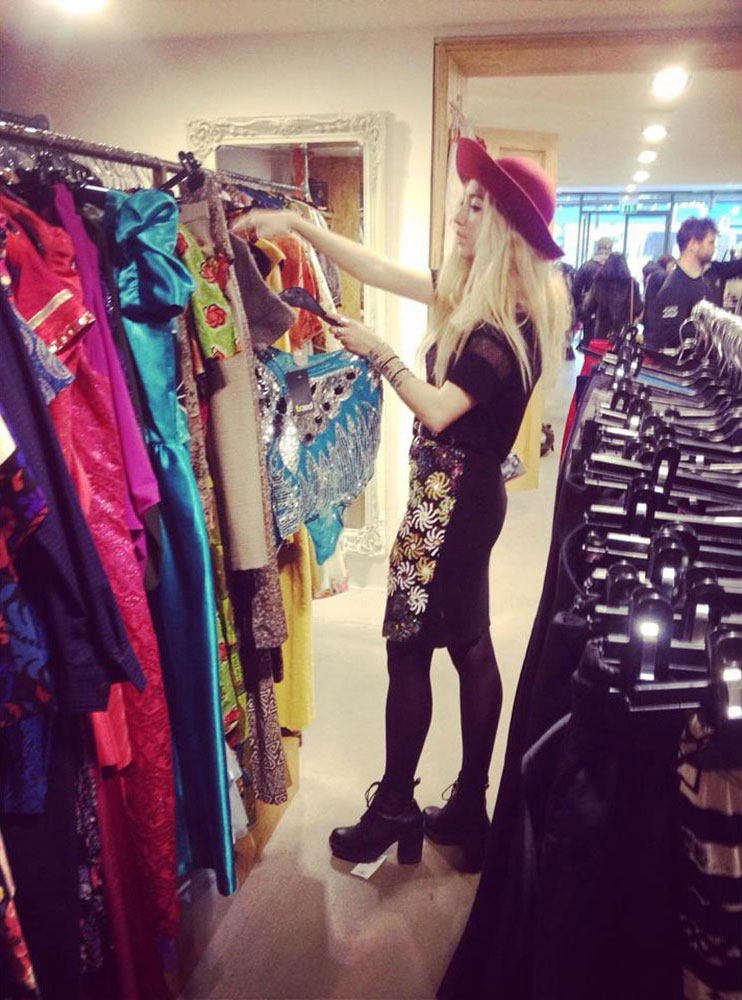This month, as part of TRAID’s Second-hand First week, LCF students were invited to come together for a clothes swap at our JPS and Lime Grove sites, encouraging students to be more sustainable when it comes to their clothing.
Students were also encouraged to take TRAID’s #secondhandfirst pledge and commit to sourcing a percentage of their wardrobe second-hand rather than buying.
Involved with helping people style the swapped clothes at TRAID’s events was BA (Hons) Fashion Textiles: Print student, Nelly Rock.
LCF News caught up with her to hear all about the event and how she thinks fashion will become more sustainable in the future.
LCF News: Tell us a little bit about Second-hand First…
NR: Second-hand First was a week long initiative hosted by the the textile charity TRAID last week from the 17th – 23rd November. The aim was to encourage people to invest in secondhand fashion and reduce waste. As part of this TRAID host a number of activities and events across their stores to engage customers and consumers in the secondhand initiative which is where I contributed with personal styling.
LCF News: How did you find out about it and how were you involved in the project…
NR: Being a textile designer I love all forms of clothing; especially secondhand. I use TRAID to source clothes for shoots or other creative projects and especially to add to my own wardrobe! I have a blog on which I mainly cover ethical and sustainable fashion. I did a review on my blog on one of the late night talks that TRAID host and decided I wanted to get involved in some way in the fashion side of things.
My role involved being based in 2 stores during the week; Hammersmith and Camden and helping customers make the most of their second hand purchases and putting together outfits.
LCF News: Why do you think it is important for people to be more sustainable when it comes to clothes?
NR: I think fashion is one of the most powerful forces in the world and this can, with a collective effort, be channelled into empowering and leading change on a sustainable level. Whether this is reducing waste, recycling, designing or protesting against fast fashion it all makes a huge difference.
LCF News: What advice would you give to someone looking to make their wardrobe more sustainable?
NR: I would say in the words of V. Westwood; buy less choose well; unless it’s second-hand then buy as much as you like!
I would say to learn the facts and that alone will drive you! There is a great book which was part of the late night TRAID talk, it’s by Tansy Hoskins, and titled ‘Can fashion ever be ethical?’. It breaks down different aspects of the industry.
I’d also say to take the second-hand pledge or try and design with previously loved materials in design work.
LCF News: Do you see the fashion industry becoming more sustainable in the future?
NR: I think there’ll be a time in the near future where we’ll have no choice but with charities and designers both making this the forefront of their work hopefully we’re onto something which will catalyze the focus in the whole industry! It would be amazing for fashion to become a movement and represent this united.
LCF News: Have you enjoyed being involved in Second Hand First?
NR: I love styling and especially with second-hand and vintage clothing. I loved working with people’s individual style and suggesting something completely new and then having fun with trying items on and having fun. It was great to work for TRAID with the diverse custom they get and contribute to encouraging the second hand movement.
I hope to carry on working towards creating ethically sourced and sustainable fashion and being inspired by organisations such as TRAID who are using it to change lives globally!
Well done to all of you who got involved in the clothes swap and pledged to have a more sustainable wardrobe.
- BA Fashion Textiles: Print
- Take a look at Nelly’s blog
- Find out more about how LCF works with TRAID
- Find out more about TRAID on their website




